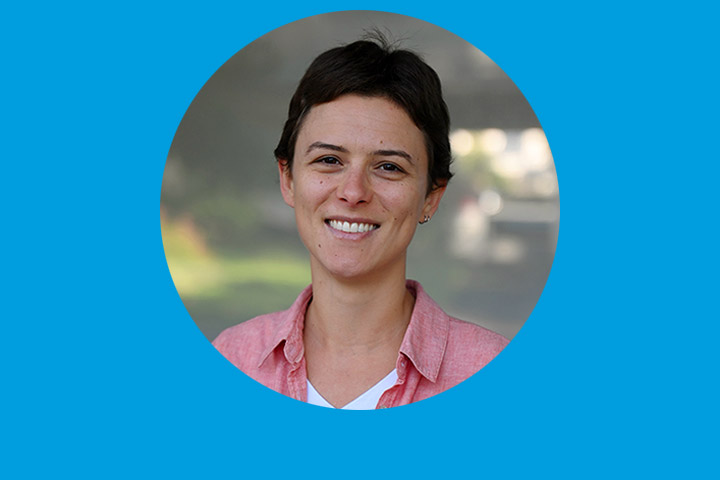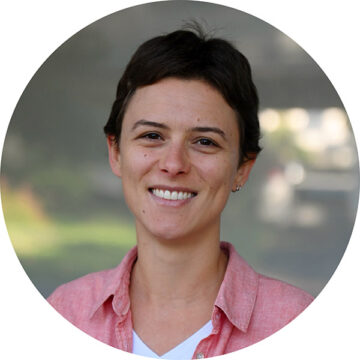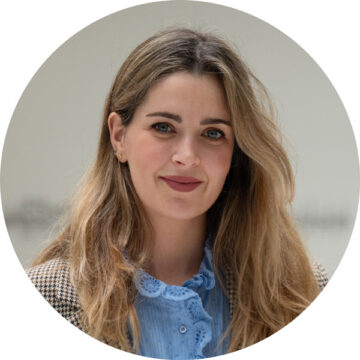
Women’s Voices: Eduarda Gervini Zampieri Centeno

This month in Women’s Voices Sara Carracedo interviewes Eduarda Gervini Zampieri Centeno, a brazilian PhD student working in computational neurosciences and songbirds at the IMN. Eduarda is passionated for Open Sciences and programming in Python. Beyond her research at the University of Bordeaux, Eduarda dreams of launching a coding camp for girls in Brazil!
Sara Carracedo: Could you introduce yourself and give a brief background about your academic journey?
Eduarda Gervini: I come from the south of Brazil, where I began my scientific career with a BSc in Biotechnology. As an undergraduate, I had the opportunity to move abroad and spend a year as an exchange student at the University of Reading in the United Kingdom. Following my undergraduate studies, I joined the Neurasmus program (Erasmus Mundus program for Neuroscience), completing my first year at Université de Bordeaux and my second at Vrije Universiteit Amsterdam. After earning my master’s degree, I returned to Bordeaux to start a PhD in Dr Leblois’ team, while continuing to work remotely and part-time as a research assistant for the team where I conducted my master’s thesis project under the supervision of Dr Douw and Dr Santos (MULTINET).
My academic and professional journey has been a constant ‘going outside of my comfort zone’ and embracing new challenges. I was initially trained in wet lab research and then, after five years and enough exposure to different techniques, I transitioned to computational and dry lab work. Nowadays, I am moving toward advocacy, leadership, and policy-making in Open Science, a movement I have been involved with since 2019.
Which is your current research focus?
In my PhD project, I am developing a computational framework, inspired by the principles of Open Science, for managing and analyzing data in Dr Leblois’ team at IMN. This framework is currently being used in various research projects, but my thesis focuses on uncovering the sleep-related neural dynamics that could underlie vocal learning consolidation in songbirds. Our team is dedicated to understanding how songbirds learn to sing, with the ultimate goal of applying these findings to gain deeper insights into how similar sensorimotor skills are learned across species.
In Amsterdam, I am responsible for implementing and supervising Open Science practices within Dr Douw’s team and coordinating a working group for a departmental transition toward this framework. An exciting project we are currently working on is our ‘Open Science Guidebook for Neuroscience’, where we tailor Open Science implementations to the context of neuroscientific/biomedical research. Next to these tasks, I also participate in different Open Science-related boards at the national and international level.
You have been deeply involved in the Open Science movement; could you tell us more about the initiative ReproducibiliTea you have created?
Eduarda Gervini: ReproducibiliTea is a grassroots initiative from the UK that brings people together to discuss improving research practices over a cup of tea. These journal clubs have spread worldwide, and I first encountered them during my master’s in Amsterdam. A friend and I started the Vrije Universiteit ReproducibiliTea, hosting monthly sessions on Open Science in a safe, informal setting. This experience fostered a sense of community and deepened our understanding of research practices.
When I applied for my PhD in Bordeaux, I knew I wanted to continue with ReproducibiliTea. I pitched the idea to the Graduate Program, received their support, and in February 2021, we had our first BordeauxTea session. The first year was a success, and by the end, BordeauxTea became an ADUM registered course, allowing PhD students to count it towards their training hours. In the second year, Fjola Hyseni joined me as a co-host, and we held ten sessions, including talks from guest speakers like
a UNESCO Science Programme Specialist.
In its third year, BordeauxTea became the first Open Science workshop on the Neurocampus, with over 60 participants brainstorming research practices for a week. I have since stepped down, but the group is in great hands, and I’m excited to see how BordeauxTea evolves.
As a woman in neuroscience, what is your opinion on gender bias in academia?
It is undeniable how present gender bias is in academia. Various fields, including Neuroscience, start with many more women in earlier career stages, but that does not translate into similar proportions at later stages of seniority, where (white cis) males remain as the majority. This ‘scissor-shaped’ reality is fairly well documented, and unfortunately, we also know that it’s not only that – even in similar positions women can still earn less.
In my opinion, a lack of diversity is always a loss to the work environment and the broader research field. More diversity fosters creativity, which is essential for problem-solving. Additionally, a diverse group of researchers is likely to design projects with more varied and inclusive goals. In biomedical research, for example, diverse datasets from different populations can enhance the generalizability of findings and improve therapeutic solutions.
In any case, I think it is also important to think not only of gender bias but also other biases that intersect with gender, including race, ethnicity and sexual orientation. We should strive for a safer and more equal ground for everyone.
As the Open Science manager in the MULTINETlab (VUMc – Amsterdam), what are your thoughts/advice about female leadership? Do you feel it is easier/harder than
for men?
While some people may have a natural aptitude for leadership, most need training and ongoing evaluation to become good leaders. This is especially true in academia, where the focus is often on detail and project execution rather than managing and leading teams. Due to a structural lack of training, academics and researchers are typically not equipped with the necessary leadership skills, which can result in supervisors unprepared for their roles, leading to environments lacking support and effective management. Furthermore, there is a lack of two-way evaluation between supervisors and students which hinders the exchange of constructive and transparent feedback. This environment is challenging for everyone, but particularly for women, who face additional structural obstacles and are generally underrepresented in leadership positions.
Leadership and management training should be a core part of research education at all levels, with a stronger incentive for women to participate. My advice is to find good mentors, community, and training to foster leadership skills. I was fortunate to have Drs. Douw and Santos as mentors. They noticed a leadership spark in me, actively worked with me to improve my skills, and provided space for me to grow. Their guidance allowed me to take risks and be bold in my aspirations.
What advice would you give to young women aspiring to enter into a PhD program?
My main advice for starting a PhD is to ensure you will be in a safe and supportive environment. Talk to others about your potential team and assess if their work ethic aligns with your values. This is especially crucial for international students, as being abroad without a support network can be challenging. Look for opportunities to build a community and support network that respects your cultural values and consider factors like access to familiar foods and a climate you’re comfortable with—these can affect how “at home” you feel at the end of the day. Finally, choose a project that genuinely interests you, and engage in extracurricular activities that bring you fulfillment and immediate rewards. The PhD journey can be lonely and slow to yield rewards, so it is essential to find daily sources of joy to sustain you through the ups and downs. For me, advocating for Open Science has been crucial in keeping me motivated and purposeful over the past four years. It brought me immense joy and rewarding moments, as well as a supportive community and valuable skills that I will carry with me for life.

Women’s Voices is an interview published in Brainstorm and on Neurocampus’ website created in partnership with the Neurocampus Parity and Inclusion Committee (NeuroPIC) a local group committed to promoting equality and organizing actions to close the gap between women and men in academia. The goal of this section is to increase the visibility of early career female researchers at the Bordeaux Neurocampus of the University of Bordeaux. We interview researchers about their scientific contributions, insights and opinions about equity, diversity and gender bias in academia. Through these interviews, we aim not only to highlight their achievements but also to serve as inspiration for our scientific community and other female scientists.
By Sara Carracedo (PhD student, IMN)
Last update 10/03/25
